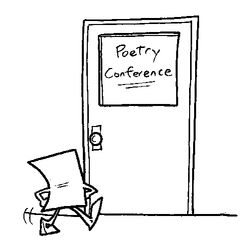
Chapter 19
Writing in a Vacuum: Workshops, Colonies, Conferences
In This Chapter
➤ What is a workshop?
➤ Finding your own critic
➤ Workshops on the WWW
➤ The lowdown on writers’ conferences
➤ The graduate degree in creative writing
We become very attached to the poems we write. In fact, some poets feel their poems are akin to children. Whether they’re beloved darlings or wayward rebels, it’s often difficult to see our poems objectively for what they are: machines of sound and meaning working toward a purpose beyond their creator. That’s a complicated way of saying that they are not really kids.
It’s difficult to see our poems for what they are; how can we tell if they are good or not, if they’re “working toward their purpose,” if they have potential? Very often we can’t. That’s why it can be helpful to show our poems to other people, especially if we’re still working the poem, trying to shape it into its perfect form.
Showing a poem to another person completes the poem’s transaction with the world. Poems weren’t really meant to sit in a drawer by themselves—that’s a lonely life for a poem. Sure, publication allows our poems to go out into the world and find their audience, but publication isn’t always easy. Besides, if you’re shooting for publication, you’re assuming that your poems are ready for that stage, when you might be missing a step—critique.
Having someone critique your poems can be a valuable experience. You will hear things about your poems that you never even considered. You will come to realize that your poems have lives of their own, and that you, as creator, have little to do with how they are perceived once they’re in someone else’s brain. Critique may help your poems to fulfill your intentions for them and may even give you the “strokes” you need to keep using the skills that you’re using well. Not all critique is aimed at pointing out the things that aren’t working in your poems. A good critic will point out the poem’s strengths, too.
Critique can be scary, especially the first few times you offer up your “children” to the chopping block. Not much will alleviate the fear of critique except for experience. Unless you’re the famous poetess shut-in, Emily Dickinson (and I’m going to assume you’re not), you have countless outlets for showing your poems to other poets for constructive feedback.
Do you need a workshop to be a good poet? Absolutely not. Does a workshop help? Sometimes. Is a workshop fun? Yes, a workshop can be a lot of fun—you’ll meet other people passionate about poetry and you’ll learn how to critique other people’s poems, which will help your own work. I encourage you to seek out a poetry workshop or other venues where you can receive some commentary on your “babies.” This chapter will help to take the anxiety out of having your poems discussed and critiqued.
What Is a Poetry “Workshop”?
A poetry workshop consists of a group of poets sitting around in a circle, talking about one another’s original work. That’s it. A workshop isn’t a group of your fans sitting around ready to praise you, nor is it a gang of poetry thugs waiting to rip your poems (and your fragile ego) to irretrievable bits. In a perfect world, the other people in the workshop are as concerned about making your poems better as they are about improving their own work.

Touchstones
I like criticism, but it must be my way.
—Mark Twain
A poetry workshop may meet once a week or more, depending on where the workshop is located, and is run by a “workshop leader.” This leader is usually trained to run workshops in a certain manner, and each leader has a slightly different style. If you don’t like the style of a workshop leader (perhaps you’ve become used to another leader’s style), try to stick it out in the workshop anyway. You may be surprised by the end of the class that you gained a lot from the difference.
The workshop leader is not your mother, father, sibling, friend, lover, rival, demigod, or pet. The leader is simply there to guide the class in the discussion of poems. All too often, the workshop leader is being well underpaid for the job. Try to be pleasant. If you truly have an aversion to the leader, simply drop the class.
In many workshops, one group of people will be experienced in the workshop format and another group will probably not have taken a workshop before. If you are part of the latter group, don’t worry. After a few sessions, you’ll be critiquing like one of the pros.
Critique
The idea of a workshop is to critique poems, sometimes called workshopping. Because there are generally so many different types of poets in the class, you will receive a wide range of critiques on your poems. You may even get conflicting critiques. For example, half the class may love lines one and three of your sonnet while the other half thinks that those are the lines you should change. You might look to the workshop leader for guidance, but he or she may not give it to you directly. The workshop leader often allows the class to express itself fully before jumping into the fray.

Touchstones
If there’s one word that sums up everything that’s gone wrong since the War, it’s Workshop.
—Kingsley Amis

Poetically Correct
Workshopping is the act of critiquing a poem in a workshop. This word often makes workshop leaders wince.
Part of having your poem critiqued is learning which suggestions to take and which to leave. My thoughts on this are that 2 percent of any given critique is generally going to work for any given poem—but that’s 2 percent of feedback that you didn’t have before. Take the 2 percent and be grateful for it!
A workshop is often a room full of egos. This can make the critique difficult, but a good workshop leader will defuse those egos and make sure that the class is all about the poems, not the people. Make sure that you’re not the student griping about the critique of your poem. You will get more out of the experience if you shut your mouth and open your ears.
What happens if you perceive that the entire workshop thinks your poem is terrible? So what? Feel free to think they are all stupid clodheads who wouldn’t know a good poem if it poked them in the eye. After you’re done feeling hurt and secretly plotting to let the air out of all of their tires, take a look at their suggestions again. Is there anything you can use? Did you really write the perfect poem and they didn’t recognize it, or is there some improvement to be made? I thought so.
One main thing you have to realize about a workshop is that the other participants are not talking about you when they offer up their critique. They are talking about your poem. There’s a difference. Sure, you created the poem, but once it’s written it has a life of its own. As you get used to having your poems discussed, the critique will sting less and help more.

Dodging Doggerel
Some beginning poets feel they don’t “need” critique on their poems. Often, these fearful or overconfident poets are writing verse that could benefit from a little tweaking—or a lot of tweaking. If you’re scared of a workshop or of critique because you haven’t done it before, talk openly to your workshop leader about your fears. Allowing your work to grow and yourself to grow as a poet might mean that you show your work to someone else and openly take his or her suggestions into consideration.
How a Workshop Works
A workshop can run in several different ways, but it has one basic structure, so that’s the one I’ll discuss here.
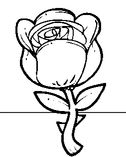
Roses Are Red
Always address the voice in the poem as the “speaker.” Don’t assume that the voice in the poem is the poet’s voice. Looking at the poem as a separate entity from the poet is the first step in learning how to critique a poem correctly. Everyone sits in a circle or semicircle. This is so that everyone can see one another. Sitting this way makes the room friendly. This isn’t algebra, remember?
There are two ways to distribute poems—the class before and the day of class. If the class has had the poem for a week or several days, the leader will choose one of the poets to read his or her poem aloud and someone else, not the poet on the “hot seat,” will begin the discussion. Having read the poem in advance gives the class the opportunity to really study the work and write their comments down. The pitfall of this method is that the members of the class are often more concerned with sounding smart in their critiques than with helping the poem discussed to improve.
If the poems are passed around the day of the class, the leader will choose one person to read his or her own poem aloud, and may even ask another class member to read it aloud as well. Someone will then begin a discussion of his or her impressions on this “new” poem. The benefit to this method is that the poet gets to hear how others interpret and feel about the poem seconds after they read it. The pitfall is that the class has less time to spend really musing on the poem and all its intricacies. This is often remedied by having the class take the poems home to write further comments on them.
Once the discussion has begun, the poet in the “hot seat” sits quietly listening and taking notes on what the other members of the class are saying about his or her poem. Some workshop leaders will insist that everyone comment on each poem, going around the room or choosing students randomly to speak, while other leaders take a more hands-off approach.
After the discussion of the poem ends, the workshop leader may allow the poet to ask one question of the class. Use this question wisely. Don’t try to explain what you think your poem is about, insult the class by calling your classmates ignorant, or stomp out screaming “You’ll pay for this!” Simply ask a question about something they discussed that you didn’t understand.
If you have no questions, thank the class and move on to the next poem in the stack. Some workshop leaders don’t even allow this question—and for good reason. There is a common feeling that the poet in the “hot seat” should not be allowed to speak about his or her poem, because many people will try to defend or explain their work rather than ask a question.
Become an Active Critic in Your Workshop
A big part of getting the most out of a workshop is learning to become good at critiquing other poets’ work. You get no Brownie points for sitting there, week after week, with your mouth shut. Doing so may cause resentment in your classmates who may then stop commenting on your work. Even if you are fearful of offering critique, try your best: Commenting will help you in your writing, too.
Poetry, like any other pursuit, is filled with jargon. Learning as much as you can about poetry and reading a lot of poems will help you to develop the language you’ll need to critique others’ poems. Reading the first section of this book will give you some of the tools you need to begin talking about poetry. Don’t worry if you’re a little confused by all the jargon. Chances are that most of things you will want to discuss about someone else’s poem are pretty basic.

Poetically Correct
Critic: a necessary evil Criticism: an evil necessity.
—Carolyn Wells
Take your cues from the more experienced members of the workshop or from the leader. Even if you only have one comment, say it. You never know how much your comment will help the poet to make his or her poem better.
Workshop Etiquette
Now that you know how a workshop works, here are a few workshop etiquette tips to help you be an outstanding member of any poetry group:
➤ Talk about the “speaker” of the poem, not about the poet. The “I” in the poem may not represent the poet at all.
➤ Don’t address the poet directly. Direct your critique to the entire class.
➤ Don’t ask the poet questions about the poem during class—reserve your questions for outside the classroom.
➤ Using phrases such as “I liked it” or “I didn’t like it” are meaningless in a workshop. No one cares about your aesthetic opinion, unless it’s backed by a concrete example. “The metaphor opening the poem works for me because it strikes me as original yet it reminds me of Shakespeare’s sonnet …,” for example.
➤ Don’t give a poem back to the poet without having written your critiques on it. This is rude and you’re likely to start getting your poems back blank as well. If you haven’t written on it, simply tell the poet that you didn’t have time and that you’ll have a written critique for them next week.
➤ Always sign your name to a critique.
➤ Don’t doodle on other people’s poems. Try not to leave coffee rings on them, or let your dog eat them.
➤ Don’t keep a poem that isn’t yours unless you ask the poet first.
➤ Try not to curse if you can help it, unless you stub your toe on the way out of the classroom. Definitely try not to curse at the other people in your workshop.
➤ If a poem offends you, try to bring your critique down to the poem’s elements. Discuss metaphor, rhythm, etc. After you’ve done that, you can mention that you were offended by the content and tell the class why.
➤ If your own poem is taking a heated beating, you’ve probably done something right! Often, the poems that get the most criticisms are the ones that intrigued the class the most.
➤ Don’t talk, flail, mime, gyrate, drool, or otherwise try to get your workshop’s attention while your poem is being critiqued. Take notes instead.
➤ Try, if you can, to begin your critique with the aspects of the poem that you believe are working. Often, learning what works helps the poet to improve more so than learning what doesn’t work.
➤ Take some time before you decide that your workshop hates you, your poems, and your critiques. It’s sometimes difficult to listen to a critique of your work—your workshop probably doesn’t hate anything about you. You’ll have to take a look at your behavior in the workshop to determine that for sure!
➤ You’re in the workshop to help others with their poems, not to attack them.
➤ Do unto others … while still being honest.

Touchstones
You do not get a man’s most effective criticism until you provoke him. Severe truth is expressed with some bitterness.
—Henry David Thoreau
Workshop Pitfalls
You might find pitfalls to perpetual workshop attendance. You may become reliant on deadlines and on the strokes and critique of others to write anything at all; some poets will learn to write for their workshop and not for themselves, in both quantity and quality. Eventually, everyone must wean off the workshop. However, this is not something you should worry about now; there are plenty of more pressing things to concern yourself with! If you’ve taken, say, 10 or more workshops in a row, consider taking a break and trying to write on your own. You can always come back to the workshop if you need it.
There’s also the dreaded “workshop poem,” the “perfect” poem with the clean ending, the poem taking little risk, perfectly comprehensible at first reading, whose form is obvious and whose moves are predictable. The workshop tends to favor these poems because they are easy and middle-of-the-road; groups in general tend to favor the mediocre. Why are there so many bad fast-food restaurants out there? Everyone understands that each McDonald’s is going to have the same McMuffin, whether it’s in Tacoma or Anchorage. The workshop poem is the McMuffin of poetry; your poems should be fine cuisine. If all of the members of your workshop adore every word of your poems, week after week, consider taking some risks in your work or consider trying a new workshop. Read Donald Hall’s famous essay, “Poetry and Ambition,” for more discussion of the dreaded McPoem.

Touchstones
Poetry is what is lost in translation. It is also what is lost in interpretation.
—Robert Frost
Workshops and Other Poetry Forums on the WWW
If you can’t get to a live workshop, there are plenty of poetry forums on the Internet where you can receive feedback on your work. Some of these are structured, paid classes, having a workshop leader, deadlines, and so on, while on other sites anyone can comment on your work.

Touchstones
To judge of poets is only the faculty of poets; and not of all poets, but the best.
—Ben Jonson
A poetry workshop or forum on the Internet has the advantage of being available 24 hours a day and enables people from all around the world to participate. The forums have the disadvantage of your not being able to choose who sees your work, but most forums have leaders watching out for misbehavior. See Appendix B, “Resources,” for a list of poetry workshops and forums on the World Wide Web.
Some poets worry about someone stealing their work if they post it on the Net. Yes, there is a danger of plagiarism, but most poets have too much ego to steal other poet’s work. Poetry is also not all that lucrative. You have just as much chance of your poems being stolen on the Net as you do if you publish them in a literary journal.
Starting a Workshop
If you have no workshop near you and you’re not a fan of the Internet, you can begin your own poetry group. All you need is a group of people who write poetry and want critique. They have to be willing to show up at a certain time and certain place. This is not always as easy as it sounds.
First, find a place that will host your group. You can hold the workshop at someone’s house or in a coffee shop if the manager will allow it.
Next, advertise. Put up flyers near a college if there’s one nearby, and post your new workshop on poetry forums on the Net. Make some calls to poetry clubs and societies if there are any in your area. If you’re really serious, take out an ad in Poets and Writers’ Magazine, or one like it. You can begin a workshop with as few as three people if you’d like. Perhaps you’ll be lucky and find more.
Finding Mr. or Mrs. Critic “Right”
If you’ve had your fill of workshops (or perhaps you don’t even like the idea of them in the first place) you can search for your very own critic: one person who is “good” for your work, who understands what you’re trying to do, and has a way of critiquing you that you appreciate and can use.
Finding this person isn’t always easy. Generally, your very own critic will want you to be his or her critic as well—a reciprocal agreement. That means you must fit his or her idea of the “perfect” critic as well. It could take years to find such a dedicated person, or you may not find one at all. Or maybe you’ll find your perfect critic at your very first poetry workshop!
You don’t need a workshop to work on your poems, but having someone “in the know” looking at your work and offering suggestions can make the difference between a poem that ends up in the bottom of the barbecue grill and one that ends up published in a good literary review.

Let Me Count the Ways
Most poets whom you admire didn’t have a writing program or a poetry workshop to attend. They wrote in solitude, or they studied on their own or corresponded with one or two like-minded poets who offered them critique. There were no grades, no workshops, no professorships after publication. What that tells us is that creative writing programs aren’t as important to the art of poetry as the poets are. Whether you can attend a writing program or not, just keep writing.
Writers’ Conferences
Writers’ conferences are like summer camps for adults. They generally last a few days to a week, and are usually set someplace where an adult with a few hundred bucks to spend would like to go anyway—the High Sierras, Italy, Key West, and so on.
Writers’ conferences are great places to meet other like-minded writers from all over the world, people you wouldn’t otherwise have exposure to. Some conferences require a sample of poetry for their strict admissions procedure, while others have an open-door policy.
Most writers’ conferences include seminars, workshops, lectures (and lots of parties!), and some even include daily writing exercises. They generally take place in the summer, when professors are on summer break and most novice writers can get some time off from their jobs. I’ve been to several of these summer conferences and they are a lot of fun.
You can find out about the wide variety of writers’ conferences in Poets and Writers Magazine or in the book Poet’s Market.
Writers’ Colonies
A writers’ colony is a space set up for serious writers at a more advanced stage in their writing. Most colonies offer space to writers for a few weeks up to a few months. Some offer scholarships, while others require a small per-day fee. They generally have a submission requirement and sometimes a publication requirement. A colony will often accept a writer early in his or her career under special circumstances, and some colonies do so regularly.
Colonies offer a quiet space for writers and provide meals and in-house workshops; the writer only needs to work on his or her writing. Again, you can find out about the wide variety of writers’ conferences in Poets and Writers Magazine or in the book Poet’s Market.
The Creative Writing Degree
During the past 20 years, the graduate creative writing program has become something of a phenomenon. New programs are springing up all over the country every year, churning out more and more “professional” poets. It must seem that the natural thing for a poet to do after getting a BA degree is to jump into a creative writing program. Certainly, thousands of people are following that track or already brandishing those degree-letters after their names, your humble author included.
The creative writing program offers students a kind of apprenticeship before being thrust into the “real” world where very few people value poetry. Academia is a place where practicing poets create a community in which poetry is the focus. Creative writing programs also enable younger poets to work closely with poets they admire.
Do you need a degree from a writing program to be a great poet? Not really. A degree may help you to get a teaching position after you’ve gotten some good publications, if that’s what you want to do. Mainly, a creative writing degree will give you two or three years of concentration in your area of interest—and its only that valuable time that helps you write great poems, not the letters behind your name.
Types of Writing Programs
The most common degrees available in creative writing are the MA (Masters of Arts), the MFA (Masters of Fine Arts), and the Ph.D. (Doctorate). The MFA is the most common and is considered the “terminal” degree, meaning that it’s the highest you can go in that realm of education.
Each program gives its students a different ratio of creative writing versus academic study. The Associate Writing Programs describe the types of creative writing degrees as follows:
Graduate writing programs are listed in The AWP Official Guide in the following descriptive categories: Studio, Studio/Academic, and Traditional Literary Study and Creative Writing. Although the aims and specific curricula of programs within each category differ considerably, the following general distinctions may be fairly made:
➤ Studio writing programs place primary emphasis on the student’s writing experience within the program. In this way, they most closely parallel studio programs in music, dance, and the visual arts. Most of the degree work is done in workshops, independent writing projects or tutorials, and thesis preparation. The study of form and theory, and of contemporary writers, may be incorporated into workshops or offered through separate courses. Faculty of such programs are selected for their achievement in the creative forms and not for scholarly work. Students are admitted to such programs almost wholly on the basis of a writing sample, and, in turn, the significant degree criterion is the quality of the thesis manuscript.
➤ Studio/Academic writing programs usually place equal emphasis, in their curricula, on the student’s writing and literature coursework, believing that the study of literature is crucial to one’s development as a writer. These programs vary considerably in the structure and amount of literature requirements, but frequently rely on the regular English department faculty, noted for scholarly achievement, for many of the literature course offerings, while writers on the program faculty offer form and theory courses, workshops, and thesis direction. Studio/Academic programs often require some kinds of comprehensive examinations, and candidates are expected to be equally well prepared in literature and in writing. Admission is determined primarily by the quality of the original manuscript.
➤ Programs in Traditional Literary Study and Creative Writing offer work in writing with experienced writers on the faculty, and allow a creative thesis, but also expect that a significant amount of the degree work will be completed in the study of literature, usually in courses taught by English department faculty. Such programs tend to align themselves firmly with the academic tradition, and emphasize training their students as literature teachers as well as writers. Often, they actively use the same criteria for admission and degree award that are applied to candidates in literature, including the comprehensive examinations and the language requirements (Associated Writing Programs).
When you begin thinking about where you want to apply, you can ask the schools you’d like to attend what type of program they offer. If you want to teach, realize that a more academic program may help toward that goal. If you want to spend most of your time writing, choose a more “studio” type program.
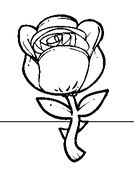
Roses Are Red
Most creative writing programs require the GRE examination for entrance. This is because most creative writing programs are affiliated with English departments. Don’t be daunted by this test—most creative writing programs don’t use the scores from the GRE as the primary criterion for acceptance. Your portfolio of poems is the most important part of your application, so make sure that it’s as strong as it can be, especially if your GRE score isn’t as high as you had hoped.
The Top Writing Programs in the United States
When choosing a writing program, one of the things you will want to look at is the program’s reputation. How many of that school’s students go on to publish their own books and win prestigious awards? Is the faculty well known, and more important, do you like their work?
Newsweek has a ranking system of most colleges in the nation, including creative writing programs. The criteria for these rankings may not be at all the criteria you will want to use to make your decision on which schools to apply to, but it’s interesting to see where the schools fall in the ranking. Here’s the lowdown on writing programs from Newsweek:
Rankings of master’s and doctoral programs in the arts, sciences, social sciences, and humanities are based on the results of surveys sent to academics in each discipline. The questionnaires ask individuals to rate the quality of the program at each institution as: distinguished 5); strong 4); good 3); adequate 2); or marginal 1). Individuals who were unfamiliar with a particular school’s programs were asked to select “don’t know.” Scores for each school were totaled and divided by the number of respondents who rated that school.
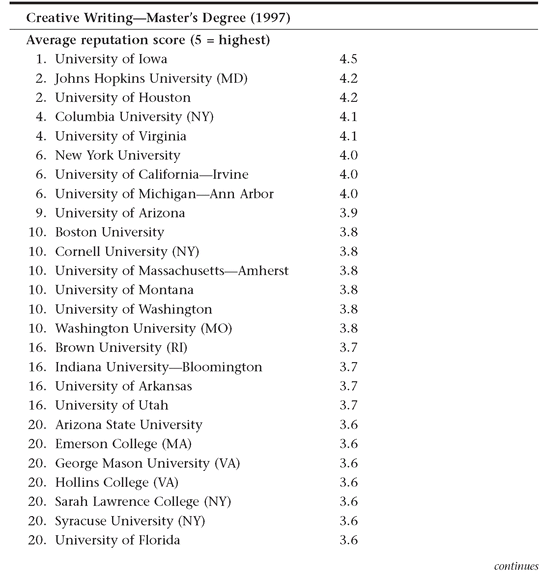
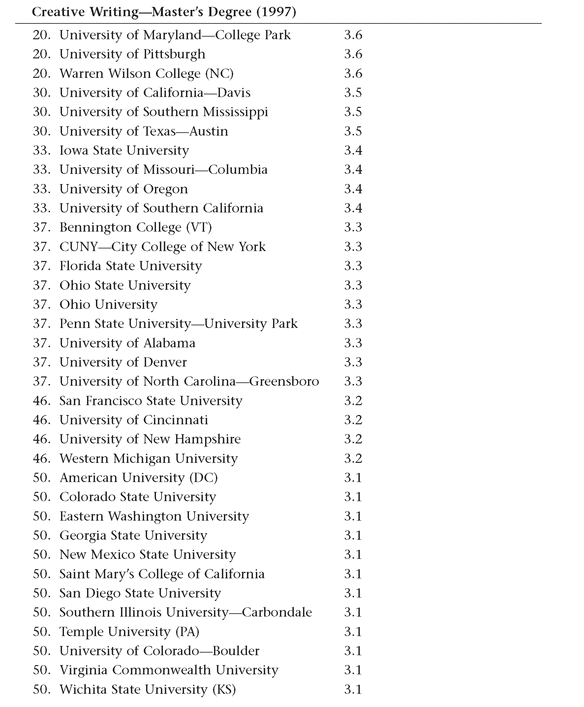
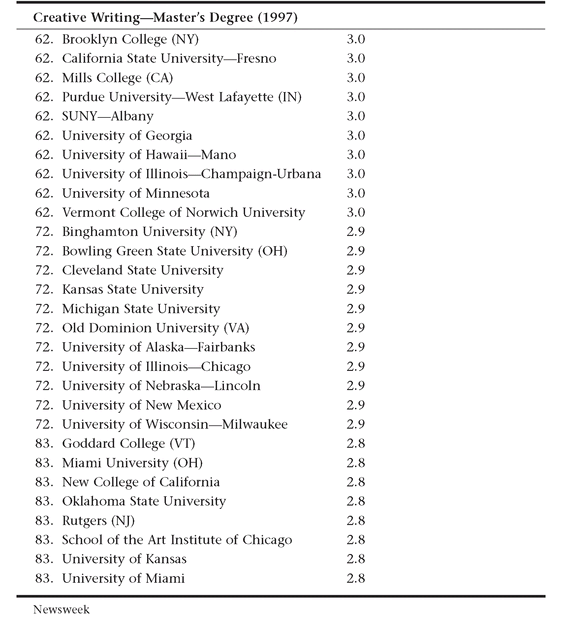
Realize that you can get a great education at a school that’s not “ranked.” Your education in writing depends on how open you are to learning and how much you practice. Don’t judge a school solely by this ranking system. Do some research of your own.
Choosing a Writing Program
You have many ways to choose a writing program beyond reputation. You will want to consider location, cost, faculty, etc. Here are some things you should consider when making your application decisions:
➤ Is there someone at the school that you really want to work with? Have you read any of the faculty’s writing? If not, do so immediately!
➤ Do you want to live in the town where the school is located? If you can schedule a visit, do so.
➤ Does the program give financial aid in the form of fellowships or scholarships? If only a few select students receive departmental aid, expect a certain tension within the student body. Some programs give all of their students aid, which allows for a less competitive feeling in the program.
➤ If the school does not give aid, can you afford it?
➤ Does the program offer teaching experience?
➤ What’s the student-to-faculty ratio of the program? If there are many students per faculty member, don’t expect to get a lot of individual attention.
➤ Does the program have classes other than the workshops that you are interested in taking? Call for a catalogue or check out the program on the Web.
➤ Can you take classes outside of the English department? Many programs will accept the credits from classes other than inside the program.
➤ Ask if the professor you want to work with is a full time faculty member at the university—often, professors are flown in from other places for short seminars. A professor can also take a grant to work elsewhere or a sabbatical. Ask if the professor you want to work with will be there, at least some of the time, while you’re in attendance.
➤ The more “famous” the faculty, the less likely that you will find a close, personal mentor. Well-known writers are pulled in a zillion different directions and you’ll just be another task on their list. Imagine—theirs is the life you might be striving for!
➤ Choose your writing program carefully—realize that you will be spending at least two years of your life there. Once you’ve committed to going, it’s often difficult to turn back.
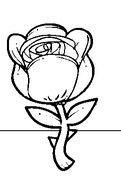
Roses Are Red
Tips for your creative writing program application …
1. The most important part of your application is your writing portfolio. Make sure it’s as strong as it can be, and place your best poems on top.
2. Your statement of purpose should be succinct and should indicate how you would be a productive member of the graduate program.
3. Get letters of recommendation from the people who know your work best. Make sure you give them enough notice to write the letters and send them on time.
4. Apply early, if possible. Don’t wait until the week before the application is due to begin gathering your materials.
5. Don’t call and nag the head of the department. You will be notified along with the other applicants. Nagging might create bad feelings, and you might want to apply again if your first application didn’t gain you entry into the program.
Exercises
Here are some exercises to get you thinking about workshops, conferences and colonies, and creative writing programs.
➤ Call the local college in your area and find out when their next beginning workshop is going to be held.
➤ Search online for workshop and poetry forum resources (see examples earlier in the chapter).
➤ Approach someone in your workshop and set up a “poetry date.” Meet with the person and exchange poems and critique. You can do this with an online poet as well.
➤ Look in Poets and Writers Magazine or Poet’s Market and find a conference that you would like to attend. Call and request informational materials for the conference.
➤ Check out some creative writing program home pages on the Web and download some applications.
The Least You Need to Know
➤ Having someone critique your poems can be a valuable experience.
➤ You don’t need a workshop to make your poems better, but it couldn’t hurt all that much to try one.
➤ Becoming an active critic in your workshop will help your own poems to become better.
➤ The Web has many places where you can receive critique on your poems—and from the comfort of your own desk chair!
➤ If you can’t find a workshop, begin your own!
..................Content has been hidden....................
You can't read the all page of ebook, please click here login for view all page.
